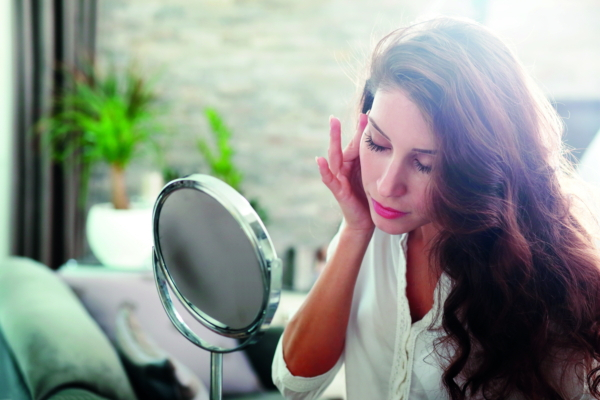
Last week the temperatures in the UAE soared to an average high of 40 degrees and it’s only the beginning of summer. The mercury levels are expected to continue rising in the coming months and most of the UAE residents are coping with the extreme heat in their own ways. Some are staying indoors during the day and blasting their air conditioners in their home, cars and offices, while the sun lovers are heading to the pool or beach.
“Extreme temperatures can play havoc on your skin and hair; during summer we see a lot more cases of fungal infections arising from sweating and moist skin,” says Dr Anwar Al Hammadi, President of Emirates Dermatology Society and Consultant and Head of Dermatology at DHA. “There are more recorded cases of pityriasis versicolor, sometimes called tinea versicolor (a common condition that causes small patches of skin to become scaly and discoloured).”
Diet plays a key role in managing hair and skin in summers “Dubai’s heat spares no one!” says Nadia Amin, a UAE resident who was born and brought up in the UAE. “During summers if I don’t take care of my skin/hair I start getting heat boils, acne and oily scalp, so I make an extra effort to stick to my skincare regime that includes washing my face with a light cleanser, followed by rose water spray to tone the skin and using a light moisturiser. Before I step out I make sure I’m wearing a good sun block (SPF 50).”
“Diet too is very important, I don’t eat junk food or drink soft drinks,” shares Nadia. She tries to eat clean and incorporate fruits and nuts (such as walnuts which are rich in Vitamin B and great for hair and nails) into her diet. She makes sure she is always well hydrated and carries a bottle of water with her.
Hair troubles
For Monika Parwani, a banking professional from Australia summers are the toughest on her hair. “It does get more difficult to handle my hair during summers because of the increased humidity, I feel my scalp is oily which makes my hair flat and lifeless. To overcome the issue I wash my hair almost every day. This ensures the oil and dust is washed off from the scalp and makes my hair look fresh and healthy.”
Haircare dos and don’ts
According to Dr Al Hammadi, just as the sun damages the skin it can damage your hair too. The saltwater in the ocean and the chlorine in the swimming pool can take a toll on your hair and in just a few weeks those shiny and easily managed locks can look and feel fried.
“In the summer we tend to wash our hair more after a workout in the gym or if you sweat and this can deplete the natural oil in the hair leaving it dry and brittle,” says Dr Al Hammadi. “Using the right products i.e. not a strong shampoo, letting your hair breathe — not wearing the hijab constantly, conditioning just the tips of the hair and not the roots, not blow-drying hair as often or brushing the hair when it’s wet,” are just some of the steps recommended by Dr Al Hammadi for hair maintenance.
Summer TLC
Summer doesn’t have to be the season of bad hair days. With some extra TLC, your hair can look great even in the steamiest months of the year.
Tips for healthy hair this summer
Seafood Fish like salmon, sardines, and mackerel are packed with healthy omega-3 fatty acids that protects our body from diseases but also help with hair growth and keeps it shiny and full.
Greek yogurt It is packed with protein but also has an ingredient — vitamin B5 that helps with blood flow to your scalp and may even help against hair thinning and loss.
Spinach The vegetable is full of vitamin A, plus iron, beta-carotene, foliate and vitamin C. These work together for a healthy scalp and mane. They keep the hair moisturised so it doesn’t break.
Guava This tropical fruit, which is full of vitamin C, protects hair from breaking. One cup of guava has 377mg of vitamin C. That’s more than four times the minimum daily recommended amount.
Iron-fortified cereal Too little iron can lead to hair loss, but this important nutrient is easily found in fortified cereal, grains, pastas, soybeans, and lentils.
Lean poultry When you don’t get enough protein, hair growth “rests”. Since it stops and older hair fall out, you can have hair loss. To get protein from meat, pick lean options like chicken or turkey, which have less saturated fat.
Sweet potatoes These are filled with an antioxidant called beta-carotene, which the body turns into vitamin A. It helps protect against dry, dull hair. It also encourages the glands in the scalp to make an oily fluid called sebum that keeps hair from drying out. Beta-carotene is also found in other orange vegetables like carrots, pumpkin, cantaloupe, and mangoes.
Cinnamon It helps with blood flow, also called circulation. That’s what brings oxygen and nutrients to the hair follicles. Sprinkle this spice on oatmeal, toast and coffees to enjoy the benefits.
Eggs This is rich source of B vitamin called biotin that helps hair grow. Not having enough of this vitamin can lead to hair loss. Biotin also helps strengthen brittle fingernails.
Oysters Cells that build hair rely on zinc, found in oysters, to help them work. Low zinc can result in hair loss and even loss of eyelashes. Zinc can also be easily found in beef, crab, lobster and fortified cereal.
Watch what you eat
Diet influences skin at the cellular level, and since skin is our largest organ, it’s also the first to show nutrient deficiency. Here are some simple tips to incorporate into your diet plans.
Watermelon It is around 90 per cent water, which hydrates the body and is loaded with Vitamin C, which is required for healthy collagen production. Its antioxidant properties help prevent signs of aging.
Berries Like blackberries, blueberries, raspberries and strawberries are packed with antioxidants, which can protect skin from the damaging effects of the sun.
Pineapple This tropical fruit contains bromelain thought to fight inflammation. It is important for people with sunburns.
Citrus Fruits Oranges, grapefruits, lemons, limes are high in vitamin C and amino acids, like proline and lysine which play a role in collagen production and can keep skin looking young.
Cucumber Contains water so they hydrate and replenish the body and skin.
Tomatoes Protect skin cells thanks to their lycopene, which not only promotes collagen production but also fights off fine lines and wrinkles.
Dandelion Greens Gives you more than your daily dose of vitamins A and K, as well as collagen-producing C. It’s also used for skin conditions like acne and eczema.
Coconut Water Its hydrating powers and hearty dose of potassium can help deliver more nutrients and oxygen to the skin by boosting circulation. This helps supports a youthful skin.











